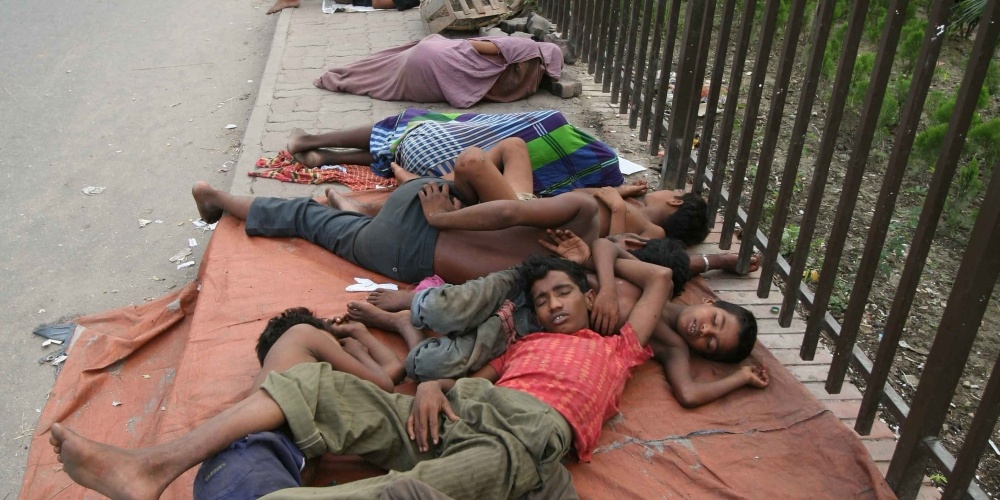
Over half of Bangladesh’s children (70 million or 44 percent of the total population of 160 million) are living in poverty and there is widespread deprivation amongst them in the basic areas of food, sanitation and shelter, with limited ability to escape their circumstances, according to a new report by the UN Children’s Fund (UNICEF) in Bangladesh.
Launched on 25 November, the UNICEF study on child poverty and disparities in Bangladesh was conducted by the Dhaka-based Human Development Research Centre (HDRC), a research and policy development organization.
“We have used seven indicators to measure the level of the deprivation of children. These are shelter, sanitation, water, information, food, education and health,” Abul Barkat, lead consultant for the HDRC study and professor of economics at Dhaka University said.
The study showed that 64 percent of children are deprived of sanitation, 57 percent are deprived of nutrition, 52 percent are deprived of information. Forty-one percent are deprived of shelter, 16 percent are deprived of healthcare and 8 percent are deprived of education.
“Children in Bangladeshi poor families face serious hardships in terms of… deprivation and vulnerability,” Nazma Quasem, vice-president of the Family Planning Association of Bangladesh (FPAB) and member of Bangladesh Children’s Rights Forum.
“These children grow up with extremely limited scope for personal growth and opportunity to escape their current state of misery,” she said
Quasem, a long-term children’s rights activist, pointed out that extreme poverty is also responsible for the presence of child labour – one out of every six children is a working child, according to UNICEF – and child abuse in Bangladesh.
She also said the extent of poverty among children can be directly connected to the educational levels of the parents.
A separate UNICEF report on child and maternal nutrition released last month found 43 percent of children under five in Bangladesh, or 7.2 million children, are chronically undernourished.
http://www.irinnews.org/report/87306/bangladesh-over-half-all-children-living-poverty
The above article outlines the dire circumstances that is the life of a child in the slums of Dhaka, the area which Eleni and her Oasis Foundation team members, Colleen Cheketri and Micheal Boston are going to work over the next two weeks. Dr Hossain Sahadat, an Ayuveydic doctor and MD from Dhaka, contacted Eleni in October, 2015 and asked her about coming to Bangladesh to treat the children of the slum areas of the capital, Dhaka, and train his team of eight doctors to do this life-changing work of Energy Systems Healing. This request started a chain-event of serendipitous meetings and connections with translators, therapists and Bangladeshi nationals that have all come together to make this trip happen.
Dr Sahadat sent an invitation to the residents of the Dhaka slums to come forward and register their children’s details in order to receive treatment during our visit. Over 600 children were registered.
All together we will be working tirelessly over a two-week period to treat these children, sometimes with a number of sessions and train the doctors on-the-job. What an incredible challenge we have before us!!
Over the past 3 months, Eleni and the Oasis Foundation team have raised the necessary funds to send the 3 therapists to Bangladesh. Eleni even walked from Brisbane to Byron Bay over the recent Christmas period (a distance of 193kms in 11days), mostly on her own to raise funds for this exceptional trip. Much gratitude and deep thanks go to all those that donated to our cause. These funds will support us while we carry out this work over the two weeks. Thank you 💖
It has been a daunting task pulling this mission together. Things move quite slowly in Bangladesh and it often would take days or sometimes weeks for messages and emails to be answered. Couple that with the language barrier between our two countries and sometimes incorrect intentions and requests were relayed instead. Bangladesh has a vastly different working culture to Australia. Their day-to-day survival is paramount and governs their every thought and action. Foreign westerners are viewed as being wealthy and that they will support the Bangladeshi people with monetary support. There is no annual leave or sick pay for employees or business people in Bangladesh. They often are paid by the aid organisations if work is carried out with them, such as will be the case with our Oasis team. This supports their families while tied up working with us. It’s a very different existence in this country.
We are grateful for this opportunity to make a difference to the children of Bangladesh. We will continue to update you along the way.
https://www.facebook.com/vinodpothina/videos/785270194828857/
